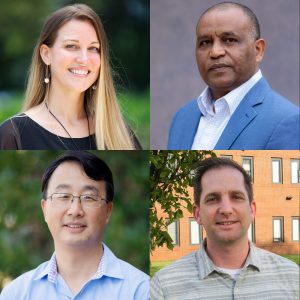
The Alabama Water Institute has selected four faculty members from The University of Alabama to serve as 2024-27 fellows in the AWI Faculty Fellowship Program.
The program recognizes UA faculty for outstanding research, extension and education programs that significantly advance UA’s interdisciplinary water-related communities of science.
In previous years, each cohort was comprised of two early career faculty fellows and one distinguished fellow. Beginning with this new class, fellows will align with and represent each of AWI’s three research entities: the Cooperative Institute for Research to Operations in Hydrology, Global Water Security Center and CONSERVE Research Group. Each fellow was selected by the entities’ respective director because of their expertise related to their mission.
The 2024 faculty fellows for CIROH are Dr. Aijun Song, associate professor of electrical and computer engineering, and Dr. Jonathan Frame, assistant professor of machine learning and artificial intelligence in geological sciences.
Song’s research focuses on wireless communications through cooperative and coordinated underwater autonomous vehicles and aquatic mobile networks. His work also contributes to an underwater “Internet of Things,” which is a system of internet-connected devices that collect and transfer data over a wireless network without human intervention.
“With my expertise in these areas and my experience in underwater robotics education, I believe I can contribute to CIROH’s broader impact,” said Song. “At the same time, CIROH provides an excellent platform for me to engage with water-related federal agencies, industry partners and a diverse group of scientists.”
Frame provides more than a decade of water resources experience that combines engineering and academic research with artificial intelligence and machine learning for operational hydrologic forecasting and modeling.
“CIROH offers a collaborative environment rich with expertise and resources that will enhance my research and professional growth, and AWI provides access to state-of-the-art facilities and advanced computational tools, which will aid my research into AI/ML techniques for hydrological forecasting,” said Frame. “Additionally, CIROH’s focus on real-world impact will help my contributions but also ensure that the outcomes are directly applicable to critical challenges in water resources.”
Dr. Steven Burian, CIROH executive director, said both Song and Frame are perfect fits to help the institute’s strategic initiatives in AI and water observing technologies and will strengthen its mission of producing research that boosts NOAA’s ability to deliver actionable water intelligence.
“Aijun’s impressive research accomplishments with underwater autonomous vehicles aligns with interests from CIROH’s federal partners related to sensors and observation networks,” said Burian. “Jonathan’s machine learning advances in hydrologic modeling are at the foundation of CIROH’s research with NOAA.”
The GWSC selected Dr. Mesfin Mekonnen as its 2024 faculty fellow. Mekonnen’s research focuses on understanding the interactions between human and natural systems in determining the sustainability of freshwater resources. His specialties include water footprint assessments, water scarcity assessments, water management, crop water use modeling, spatial modeling and water for energy.
“This fellowship will enable me to incorporate cutting-edge research, particularly in areas like water conservation, sustainable agriculture and water security directly into GWSC’s research activities,” said Mekonnen, assistant professor in UA’s College of Engineering. “In return, the support and resources provided by GWSC will allow me to push the boundaries of my work, benefiting both my research outcomes and the educational experiences I can offer to students.”
Mekonnen’s work will support the GWSC by integrating his research on the changing water footprint of food into the center’s products and publicly accessible data.
“GWSC is a translation organization, bringing the best science into national security decisions,” said Mike Gremillion, GWSC director. “Being able to tap into the best science, like the kind Mesfin does, is critical to our work.”
Dr. Rebecca Totten is the 2024 faculty fellow for the CONSERVE Research Group. Totten’s research centers around Antarctica, studying the dynamics of glaciers and their contribution to sea-level rise over time, as well as the rapid changes of ice sheets over the past few decades. Her desire to be CONSERVE’s faculty fellow stems from wanting to learn more about UA’s interdisciplinary water-related research efforts and to help create new partnerships that can solve problems such as water availability, quality and environmental and ecological impacts.
“Perhaps what motivated me most to participate in CONSERVE as a faculty fellow, however, is that community engagement is central to the mission of CONSERVE,” said Totten, associate professor of geological sciences. “As a native of New Orleans who lost my home and neighborhood during Hurricane Katrina, I am highly motivated to research climate impacts and to connect what we learn to benefit communities across the region, so many of which are vulnerable to climate change.”
Totten is also developing projects for CONSERVE that will investigate eDNA from sediments in floodplains, as well as bringing new analytical instrumentation that will serve areas like geosciences, archeological sciences and art history.
“The CONSERVE Research Group is delighted to welcome Dr. Totten as our AWI CONSERVE faculty fellow,” said Michael Fedoroff, CONSERVE director. “Dr. Totten’s demonstrated track record of high caliber scholarship and innovative research will build capacity in our own research portfolios and help build the CONSERVE brand of quality.”
AWI awards faculty fellowships annually to affiliated candidates, with each fellowship lasting three academic years and including an annual stipend. Fellows demonstrate strong interdisciplinary water-related research, education or extension programs aligned with AWI’s mission to drive cutting-edge research and train future scientists for a water-secure world. They also represent the intstitute, actively contributing to its initiatives and promoting the institute across UA, its partners and the public. They enhance AWI’s visibility through participation in the monthly WaterWorks talks and interdisciplinary proposals. Together, AWI Faculty Fellows form a campus-wide community that tackles interdisciplinary research opportunities, building impactful projects that benefit both the University and society.